| Tell a friend | Print version |
|---|
Neustrashimy: mission possible
The escort ship, which is commanded by Captain 2nd Class Alexey Apanovich, returned to its base of Baltiysk from an extended mission at distant seas on February 8. The mission was unique in nature: for the first time in the modern history of the Russian Navy, a ship of the Baltic Fleet spent two and a half months (from the end of October to the beginning of January) helping provide security for civilian ships in the infamous Gulf of Aden.
During the mission, the Russian escort ship made an official visit to the Libyan port of Tripoli and two business calls at Aden (Yemen). The Neustrashimy also escorted 13 convoys with at least 60 ships through the pirates-infested waters of the Horn of Africa and responded to a distress call from the Yemeni fishing boat Line Hadedda, which was adrift in the Gulf of Aden.
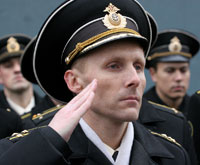
Senior mission officer on the Neustrashimy, Captain First Class Oleg Gurinov
This past January marked the 16th year since the Neustrashimy joined the combat division of the Baltic Fleet. According to Fleet tradition, the Neustrashimy was named after the squadron of the Neustrashimy torpedo boat, the first destroyer built in our country after the Great Patriotic War (WWII). The contemporary Neustrashimy was built at the Yantar Shipbuilding Factory and has been the only battleship of its design in the Russian Navy since 1993. Since its “birth,” the ship has been serving under the Andreevsky flag in the antisubmarine brigade.
Those serving in the Baltic Fleet will tell you that the Neustrashimy is the workhorse of the Fleet. Since 1994, the ship, within a strike group, has won multiple prizes instituted by the commander of the Fleet in the categories of air defense, anti-sub defense, and artillery preparation, while the sailors and sub-officers of the ship are frequently assigned to other ships of the Fleet and dispatched to other important missions, as a recognition of their high level of training and command of their specialties.
The Neustrashimy has taken part five times in the international war exercises Baltiyskaya Operatsia, as well as in the Baltic maneuvers with foreign navies in 2004, 2006, and 2007, in which the Baltic seamen gained valuable experience in the conduct of peace operations in open sea, improved on compatibility in operation with their foreign colleagues, and worked toward better interregional understanding and cooperation. In fact, German and American seamen never fail to mention the professionalism of the Neustrashimy crew.
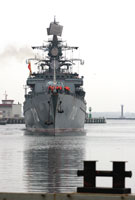
Setting course toward the home base
In addition, the ship has carried out tasks during missions to distant seas, and it has completed friendly visits to ports in Norway, Germany, Sweden, Denmark, Belgium, Poland, France, and recently in Libya. In 2003, the year of the Fleet’s 300th anniversary, the ship successfully completed an official visit to London. Russian President Vladimir Putin then toured the ship and signed a number of international agreements on it.
The Neustrashimy was named best ship of the Russian Navy in the category of combat readiness in 2000, 2005, 2006, and 2007. It also ranks first among ships of its class at the Baltic Fleet.
The Neustrashimy is a multipurpose ship of the frigate type whose main task is to provide air defense, as well as defense against other opposing surface ships and submarines. It encompasses the best designs of Soviet shipbuilders of the 1980s. But the ship is mostly unique for the fact that it remains the first and only Project 1154 ship built so far, of the 70 planned.
There is no doubt that given today’s level of complexity in ship equipments and the technologies involved, the requirements set before sailors are quite high. But sailors of the Baltic Fleet are showing time and again that they are up to the task; in fact that, this is reflected in the number of thank-you letters and awards they have received. And the sea, an unpredictable environment, regularly tests youngsters with storms, tiring waves, and sheer hard work. Nonetheless, after the training they undergo on the Neustrashimy, the young sailors grow to become real men. What is more, what these young men learn while serving on the ship goes on to serve them well for the rest of their lives.
This, by the way, has much to do with the various sponsors of the Neustrashimy, first among them the Modern Academy for the Humanities. Since the signing of the sponsorship agreement in 2001, the crew of the Neustrashimy and the Academy have been bonded by a solid friendship. The Academy became the first institution of higher learning to sign a sponsorship agreement with a battleship of the Russian Navy. The first sponsorship action on the part of the Academy has been the provision of free education to the crew of the ship and their families at the Academy. Since then, 8 people have graduated from the Academy and another 8 are currently enrolled. The Academy recently donated a personal computer to the Neustrashimy, along with software, allowing the crew to improve their professional skills directly at sea. The donated stationary, TV sets and video cameras allow the seamen to organize leisure time right on the ship.
The command of the Baltic Fleet has repeatedly expressed gratitude to the president of the Academy, Professor Mikhail Karpenko, and the director of the Kaliningrad branch of the Academy, Alexander Chaplygin, for the active participation of the Academy in the improvement of the level of instruction of Baltic Fleet seamen and the constant and multiple acts of material help…
After leaving Baltiysk on September 24, the Neustrashimy crossed the Atlantic and Mediterranean oceans, passing through the Suez Canal, before reaching the Red Sea, where it engaged in the protection of Russian ships against the attacks of Somali pirates, who are known to be infesting this region of the east African coast. The first encounter with pirates did not take long to materialize.
The Neustrashimy and the British frigate HMS Cumberland stopped an attempt by pirates to capture the Danish ship Powerful. The pirates had attempted to open fire from machineguns and capture the cargo ship. The joint actions of the British and Russian ships stopped the pirates in their tracks. A Ka-27 helicopter aboard the Neustrashimy and a Lynx helicopter aboard the HMS Cumberland participated in the effort.

Home, sweet home!
After that, the Neustrashimy was joined in the Gulf of Aden by the supply ship Yelnya of the Baltic Fleet, which was to re-stock the ship in fuel, water, and food. To protect against pirate attacks, the Yelnya had on board marines armed with light and heavy weapons.
Again in mid November, the Neustrashimy stopped another pirate attack in the Gulf of Aden against the Rabih, a ship sailing under the Saudi Arabian flag. The Neustrashimy received the distress call as it was escorting three ships: the Russian Sachi Maru, the Greek Ellivita, and the Chinese Nord Saturn. The Rabih, which was 30 nautical miles away from the Neustrashimy, was being attacked by pirates in fast boats. The Neustrashimy crew, through radio communication, recommended that the Rabih increase its speed. In the meantime, the Neustrashimy, after leaving an anti-terror group on the Sachi Maru, immediately set course toward the Rabih, sending its Ka-27 helicopter ahead. The professional and timely actions of the Russian sailors thus stopped an unfolding pirate attack against a civilian cargo ship, sending the pirates fleeing. The Russian ship returned afterward to the convoy and continued its escort.

After a long separation
Around November 20th, the Neustrashimy was already escorting a convoy of nine ships through the Gulf of Aden.
Somali authorities, seeing how in demand were Russian sailors, announced that the presence of the Russian Navy in the region was of great importance to them. The Somali ambassador in Russia, Mohammed Mohamud Handule, told the Russian TV channel Vesti: “Russia did not just come to our coast, it did so with the agreement of Somalia. Unlike many others, who first came and only afterward asked for permission. And we want not only the Neustrashimy to come, but also other Russian ships.” All the while, the ambassador stressed that “The presence of the Russian Navy as a strategic partner is beneficiary for us.” In the meantime, a meeting between Captain 2nd Class Oleg Gurinov and the commander of the French Navy in the Indian Ocean, Admiral Gerard Vallen, took place on November 19 on the Neustrashimy. The two discussed issues related first and foremost to joint actions in the fight against piracy at sea in the region of the Horn of Africa.
In fact, the situation off the Somali coast degraded in a geometric progression at the end of last year. Think about it: if in 2008 news of civilian ships being captured by Somali pirates in the Gulf of Aden appeared about once in a month, in past months such news has become an almost daily occurrence. How similar the situation around the Somali coast is to a “theater of war” is illustrated in this story told by Alexander Kryachkov, a senior aide to the captain of the Cypriote ship Rickmers Doha:
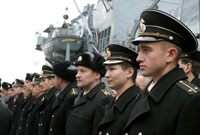
Neustrashimy, the pride of the Baltic Fleet!
“We met the Neustrashimy at the eastern “point”: it had just escorted a convoy originating from the western part of the Gulf of Aden. Immediately, a new convoy was formed in which our ship was included. We remained in the constant protection of the Neustrashimy during the entire duration of the passage. And here I want to say a few words about the actions of the Russian escort ship. I don’t know which epithets to use here: clean, professional, concrete and correct leading of the convoy on the part of the captain of the ship, immediate reaction to the slightest suspicion of danger. All this is why we admire the Neustrashimy.
“Halfway into the passage to the western “point,” the ship Diana S joined the convoy. Then it broke away and continued on its own. We also left the convoy escorted by the Neustrashimy at the western “point.” But it didn’t take half an hour for something to happen! The Diana S, which was 3 miles ahead of us, sent out a message indicating that it was being approached by two swift boats full of armed, masked people. And three fast boats sailed past us, but I couldn’t tell exactly who was in those boats.
“The Neustrashimy reacted momentarily: it covered from the air the cargo ships in the convoy transporting chemicals, and us with its helicopter. The copter forced the fast boats to stop and inspected them from the air. The Neustrashimy, having found nothing suspicious in the fast boats and after making sure they represented no danger to us, and apparently having received the order to back off, left.
”I want, on behalf of our entire cargo ship, to express my gratitude and indebtedness to the captain of the Neustrashimy and its crew for their highly professional work during the safe passage of our ship through this dangerous region.
It is doubly pleasant that the Neustrashimy represents the famous Baltic Fleet!
Neustrashimy, you are the best!”
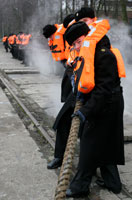
The long-awaited return to Baltiysk
In the meantime, the Neustrashimy continued its mission in the Gulf of Aden. It escorted cargo ships in the region where pirate attacks are most frequent, and came close enough to the nearest ports to re-stock on supplies. In the meantime, the headquarters of the Russian Navy was continuing to receive thank-you letters not only from Russian companies, but also from ship owners from all over the world addressed to the Neustrashimy. Here is a sampling of such letters:
“The Murmansk Shipping Company expresses its gratitude for effective work in providing security during the passage of our ships in the Gulf of Aden under the escort of the Neustrashimy. The information received from the captains of the ships after the completion of the escort is proof of a high level of organization in the formation of caravans and their escort.
“Of course, we take all technical and organizational measures in our power to ensure the security of our ships working in the regions infested with pirates. But, as is evident from an analysis of attacks against ships, the most potent security measures during sailing in dangerous waters is a Russian Navy escort.
Respectfully, the director for shipping, accredited representative of OAO Murmansk Sea Shipping Company, V.A. Ermolin…”
“Under the request of the captain of the Stalt Markland, we are relaying the expression of gratitude from the crew for the organization of safe passage through the Gulf of Aden.
“Respectfully, the captain V.I. Gorelov…”
“We are grateful to the crew of the Neustrashimy for escorting through the Gulf of Aden two ships, the Voruta and Skalka, owned by our company, PC Lithuanian Shipping Company. Our company highly values your noble and effective help.
“Respectfully, General Director Vitautas Vismantas…”
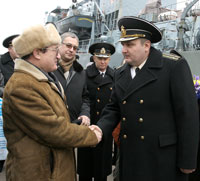
Rector of the Modern Academy for the Humanities, Professor Valery Tarakanov, and commander of the Neustrashimy, Captain 2nd Class Aleksey Apanovich
“The Fesco Yenisey, which belongs to the Far East Shipping Company and sails under the flag of the Marshall Islands, was on a voyage on December 28 to the port of Bender-Khomeini, Iran, from Lake Charles, U.S. The ship was in the Gulf of Aden between December 8 and 11 in a convoy under the escort of the Neustrashimy. A group of marines was on the cargo ship for security reasons. Thanks to the actions of the marines, the cargo ship was able to cross the dangerous region and reach its destination. “The Russian Navy once again demonstrated that it is capable of performing one of its main tasks: protecting civilian ships at sea and ensuring free navigation at sea.
“The Far East Shipping Company and the crew of the Fesco Yenisey express their gratitude to the crew of the Neustrashimy under the command of Captain 2nd Class Alexei Apanovich for ensuring the safe passage of the cargo ship through the dangerous waters of the Gulf of Aden. We are convinced that the Russian Navy will remain the pride and the dependable shield of Russia in the World Ocean.
“Respectfully, Managing Director of Far East Shipping Company V.N. Korchanov.”
“…There is no doubt that crossing the Gulf of Aden is becoming more and more difficult, despite the fact that traffic here remains quite intense. Who will be the pirates’ next victim? More likely a ship that would, for financial reasons, decide to cross the Gulf of Aden on its own, and ship owners who will decide that ensuring themselves is enough. But the pirates do not demand to see an insurance policy.
“-Our ship can use firearms against pirates: from large-caliber automatic guns to grenade launchers—mission commander, Captain First Class Oleg Gurinov stresses. The use of artillery missiles is not planned, since that is not necessary.”
Meanwhile, a civil war is underway in Somalia. And pirates form these parts have grouped in four main units, the first of which is the so-called Marines: they observe strict discipline and are equipped with the latest technical means, including weapons. They are responsible for 80% of all pirate attacks. Their biggest prize so far has been the Saudi supertanker Sirius Star, which transported $100 million dollars’ worth of oil.
-The captured ships are first taken to the Horn of Africa before being led further east, says Captain First Class Gurinov. They are anchored very close to Somali territorial waters.
Pirates, corsairs, and freebooters have been around since the beginning of shipping, more precisely form ancient times. A pirate’s luck for the most part depends on the attitude of the countries in whose territorial waters he operates.
The first experience of the Russian escort ship Neustrashimy in carrying out the set mission has showed the need for a permanent presence of a Russian Navy ready to use the most decisive measures in the Gulf of Aden, said Admiral Vladimir Vysotsky, the commander of the Russian Navy, during the mission of the Neustrashimy in the Gulf of Aden. The level of such a presence will be determined based on developments in this region of Somalia.
He also stressed that the planning of the action of Russian ships is done in relation to the increasing rate of pirate attacks in regions of intense traffic. But the actions of the Russian Navy will remain strictly in line with UN documents, international law, and existing bilateral agreements. That’s why a careful analysis of the situation in the Gulf of Aden is conducted at the headquarters of the Russian Navy and its actions are coordinated with the ships of the navies of other countries present in the region.
At the same time, the EU has launched a naval operation—a first in its history—directed against Somali pirates. The warships are providing security to civilian cargo ships sailing under the flag of EU countries and those freighted by the UN and other international organizations to ferry humanitarian aid to Somali.
As regards cooperation between the Russian Navy and the EU in the fight against pirates off the Somali coast, according to Vladimir Voronin, the head of the Department of European Cooperation at the Russian Foreign Ministry, such actions are examples of how effective cooperation in solving everyday problems can be. What’s more, negotiations are under way between Russia and the EU on signing an agreement on the fight against piracy and coordinating actions.
For example, in the beginning of January, the Neustrashimy received a message from an aircraft of the basic aviation patrol of the French Navy Atlantis about the presence 25 miles away from the escort ship of a small - supposedly fishing - boat without steering. The ship was not communicating on international communication channels and had raised a white flag; a call for help. People were visible on its bridge, some of them lying around and the ship itself apparently without defense against waves.
Since the Neustrashimy was closest to the distressed ship, it was decided to approach it, to establish what help was needed.
After two hours, the Neustrashimy located the fishing boat, the Line Hadedda. The crew of the Neustrashimy saw nine people on the bridge and thrown about fishing equipment. A makeshift white flag was raised.
An advanced team from the Neustrashimy armed with machineguns and an interpreter was dispatched to the boat. The Line Hadedda relayed communication indicating that there were ten people on the ship; nine men and a pregnant woman who was in immediate need of medical care. There were no arms, controlled substances, or illegal immigrants on the boat. The ship was transporting a cargo of smoked fish. The captain of the ship, who had a weak command of English, said that four days ago the ship lost steering capability and communication, and that the crew had only rice and fish left for food. All fresh water had been exhausted. The crew was kept warm at night with a fire that was made using wood from the ship’s paneling. The coal from the burned wood was used as food as well. The captain showed the Russians three Somali and seven Yemeni passports, declaring that the ship was sailing to the Yemeni port of El Mukallas from the Somali port of Mogadishu.
The Baltic seamen re-stocked the ship with bread, sugar, tea, various cereals, and fruits. A medical team led by Colonel A. Markov and Major A. Ermakov examined the crew and discovered that every member suffered from dehydration and food starvation. In addition, the pregnant woman, besides the overall fatigue, was suffering from bronchitis. The medics helped the woman. After some time, she felt better.
The Neustrashimy then towed the ship towards Yemeni waters…
For the seamen of the Neustrashimy, these stories are now only memories. The ship was met at its home base by an orchestra, the families of crewmembers, the command of the Baltic Fleet, members of the administration of the Kaliningrad region, as well as delegations of sponsors from Moscow, St.Petersburg, and the Leningrad region.
One of those esteemed guests who flew in from Moscow to welcome the Neustrashimy was the rector of the Modern Academy for the Humanities, Professor Colonel (Ret) Valery Tarakanov. “What are your feelings after welcoming back the ship you sponsor?” Tarakanov immediately answered:
-The collective of the Academy has been closely following in the media the actions of the Neustrashimy in the Gulf of Aden. Of course we worried, but we were also happy for their successful actions in the fight against piracy in the Horn of Africa, were proud of our sponsored ship. And when we learned in January that the ship was returning to its home base, we began preparing for the long-awaited meeting with this crew that has become ours.
And the Neustrashimy finally moored at its home base. The commander of the mission, Captain First Class Oleg Gurinov reported to the commander of the Baltic Fleet, Vice Admiral Viktor Mardusin, about the completion of the mission to distant seas. In his turn, the commander of the Fleet thanked the crew for successfully carrying out an actual combat mission, since the crew of the Neustrashimy had to use arms at times while escorting cargo ships. According to Captain First Class Oleg Gurinov, in such instances the ship fired warning shots, but the situation was no less dangerous.
-Many pirate attacks were off the coast of Somalia were indeed rebuffed with the use of our helicopter, said the commander of the air group, Colonel Stanislav Drobych. The ship, when escorting a convoy, cannot break away from it. That’s why we had to take on the task of stopping attacks.
As regards news of “technical bugs on the ship and instances of crewmembers becoming sick during the return trip from the Gulf of Aden,” this, according to Captain 2nd Class Alexei Apanovich, put mildly, has nothing to do with reality. All crewmembers are healthy, and the ship itself returned from southern latitudes unassisted. The Baltic seamen are now resting after the combat mission, and the Neustrashimy is being readied for the next mission, which, I am confident, will be no less glorious than the one in the Gulf of Aden.
Source: , author: Sergey Vasiliev, picture: Viktor Shelygin. 18.02.09
Translation: RusNavy.com



